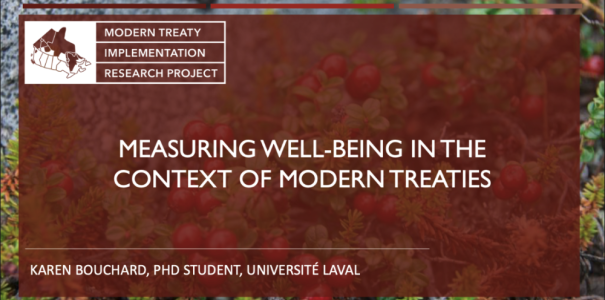
Research Bytes: Measuring Well-being
Research Theme: Implementation Evaluation and Socio-Economic Impacts
The first video in our new Research Bytes series features Karen Bouchard talking about measuring well-being in the context of modern treaties. Research Bytes is a new series of short interviews highlighting the work we are doing on modern treaty implementation.
Click here to view Karen's video!
Karen Bouchard is a PhD student at Université Laval and currently working with the Modern Treaties Implementation Research Project (MTIRP). She is currently working as Research Assistant under the Implementation Evaluation and Socioeconomic Issues Research Theme where she focuses on the Measurement of wellbeing in the context of Modern Treaties.
Modern treaties are regarded as transformative and highly effective tools for reconciling Indigenous peoples and improving their lives. As a result, developing a transparent, consistent, and contextual measurement of well-being that is relevant to the cultural realities of modern treaty citizens could provide a holistic way to assess whether, and under what conditions, such agreements can effectively reduce socio-economic disparities and improve the quality of life of Indigenous communities.
Karen draws on her Indigenous Wellbeing Measures and Frameworks Research paper, which examines the methods, approaches, and benchmarks used to identify, measure, and monitor Indigenous well-being using indicators and tries to address three fundamental concerns about Indigenous wellbeing measurement: (I) Why should we measure well-being in the treaty context? (II) How can we measure Indigenous well-being? (III)What are the limits of these types of measures?

